|
From the Dean
 For many of you, the message this month is ‘Welcome Back’. Whether they have been away from campus for the summer or not, when I ask people how their summer was, the most common response I get is ‘short’. I hope your summer was productive and that you also found some downtime before we launch the fall semester and many other fall activities. For many of you, the message this month is ‘Welcome Back’. Whether they have been away from campus for the summer or not, when I ask people how their summer was, the most common response I get is ‘short’. I hope your summer was productive and that you also found some downtime before we launch the fall semester and many other fall activities.
Speaking of the fall semester, very soon more than 3,400 undergraduate and graduate students will begin or continue their studies in the College. Traffic and parking issues aside, I have always loved this time of year when the energy and activity on campus shifts into the highest gear in a matter of days. It is a time of promise and potential as we begin our work with new students or with returning students in new classes/new ways.
I spent a lot of time this summer around the state and the country connecting with alumni, and I regularly heard stories of faculty and staff who made a difference in their lives, pointed out a path they had not seen, pulled them through a tough time, inspired them to expand their dreams – I could go on. As we start a new academic year, I wonder how many of those moments will happen this fall – moments when our faculty and staff literally open up a new world to an undergraduate or graduate student. I am proud of the fact that the first land-grant mission – teaching – remains front and center for our College.
Dr. Marcos Fernandez and our Office of Academic Programs (OAP) team and Assistant Dean for Graduate Programs Dr. Shawn Donkin have a busy semester in store. OAP will be leading a number of teaching workshops as a complement to the work of Purdue’s Center for Instructional Excellence. These workshops are designed to help faculty and staff continue to improve what happens in the classroom as our students and the technology and approaches we have available in the classroom continue to evolve.
While Purdue gathers student evaluations of courses and instructors, there are some aspects of teaching that are more appropriately assessed by peers, so OAP will be piloting some peer evaluation of teaching this year with the goal of attaining and maintaining excellence in the classroom. At the graduate level, Shawn is working on a new professional development series for our graduate students to aid in preparation for their preferred career path.
We will put a big spotlight on our teaching mission with the Celebration of Teaching Excellence day on September 17. Murphy Award winner Dr. Larry DeBoer and Graduate Teaching Award winner Dr. Linda Lee will give talks, and Dr. Kirby Barrick of the University of Florida will conduct a teaching workshop. Faculty and staff are also invited to participate in the Showcase of Purdue Agriculture Teaching – Innovation and Excellence in the afternoon. (Read more in this issue of InFocus.)
I am really looking forward to this academic year. We have a lot going on as a College, including rolling out our 2015-2020 strategic plan. I wish each of you a terrific fall—and thanks for all you do in support of our students.
All the best,

PS: The Indiana State Fair is in full swing, and our College has a great new home in the Purdue Extension Ag & Hort Building. My thanks to Danica Kirkpatrick, Dr. Renee McKee, and the army of Purdue Extension specialists and Educators, as well as all the faculty and staff who make our presence at the fair happen. If you have any free time over the weekend, consider a trip to Indianapolis and check out the Indiana State Fair!
|
|
Purdue Agriculture People
|
Ag Research Spotlight: Farzad Taheripour
 The Ag Research Spotlight shines each month on an individual whose work reflects our commitment to the six strategic themes that guide Agricultural Research at Purdue. Our spotlight for August is on Farzad Taheripour, Agricultural Economics, whose work underscores the theme, “Facilitating informed decision-making to improve economics and social well-being.” The Ag Research Spotlight shines each month on an individual whose work reflects our commitment to the six strategic themes that guide Agricultural Research at Purdue. Our spotlight for August is on Farzad Taheripour, Agricultural Economics, whose work underscores the theme, “Facilitating informed decision-making to improve economics and social well-being.”
Full story: https://ag.purdue.edu/arp/Pages/Spotlight-Taheripour.aspx#
Traffic safety, preparation encouraged as fall semester nears
 As Boiler Gold Rush and the start of the semester draw closer, Purdue is reaching out to students, faculty and staff to encourage increased diligence, attention to traffic and preparation, particularly related to the closure of northbound Interstate 65. Students attending Boiler Gold Rush will move into their on-campus housing on Aug. 17-18, accommodating a shifted Boiler Gold Rush schedule. Boiler Gold Rush will take place Aug. 19-22. Residence hall contracts for returning students begin Friday, Aug. 21. The first day of classes is Aug. 24. Purdue is alerting all students to the closure of northbound Interstate 65 and advising them to seek alternate routes to campus, to expect delays, and to watch for help and guidance from state, area, local and Purdue law enforcement agencies. Purdue faculty and staff are being reminded about possible disruptions to traffic, parking and other activities in the central campus area during the move-in days. Employees should anticipate delays and give themselves additional time for their morning commutes and/or to travel around campus for meetings during this period. Departments and supervisors are asked to exercise discretion and an extra degree of understanding if the additional activity during the workday causes unavoidable delays for workers. As Boiler Gold Rush and the start of the semester draw closer, Purdue is reaching out to students, faculty and staff to encourage increased diligence, attention to traffic and preparation, particularly related to the closure of northbound Interstate 65. Students attending Boiler Gold Rush will move into their on-campus housing on Aug. 17-18, accommodating a shifted Boiler Gold Rush schedule. Boiler Gold Rush will take place Aug. 19-22. Residence hall contracts for returning students begin Friday, Aug. 21. The first day of classes is Aug. 24. Purdue is alerting all students to the closure of northbound Interstate 65 and advising them to seek alternate routes to campus, to expect delays, and to watch for help and guidance from state, area, local and Purdue law enforcement agencies. Purdue faculty and staff are being reminded about possible disruptions to traffic, parking and other activities in the central campus area during the move-in days. Employees should anticipate delays and give themselves additional time for their morning commutes and/or to travel around campus for meetings during this period. Departments and supervisors are asked to exercise discretion and an extra degree of understanding if the additional activity during the workday causes unavoidable delays for workers.
Full story: http://www.purdue.edu/newsroom/purduetoday/releases/2015/Q3/traffic-safety,-preparation-encouraged-as-fall-semester-nears.html
Program teaches future students what agriculture has to offer
 Sebastian Macias wants to be a software engineer. Thanks to his participation in the Purdue Agribusiness Science Academy summer program, the East Chicago, Indiana, high school student got a glimpse of his future. Macias was one of 27 high school students who participated in PASA, a two-week program that targets underrepresented minorities and first-generation college students and introduces them to professional opportunities in the agriculture industry. “I enjoy robotics, and I enjoy programming,” Macias said. “It’s something I want to do as my career. I want to become a software engineer. I believe, because of PASA and other courses, I will be able to make it happen.” The program is broken down into three tracks: sustainability, forensic science and business education. Students attended classes on Mondays, Wednesdays and Fridays over the two weeks. On the other days the students traveled the state, learning about agriculture through tours provided by businesses such as Dow AgroSciences, DuPont Pioneer and Fair Oaks Dairy. Financial support was also provided by Elanco and John Deere & Co. through partial scholarships to participants. Sebastian Macias wants to be a software engineer. Thanks to his participation in the Purdue Agribusiness Science Academy summer program, the East Chicago, Indiana, high school student got a glimpse of his future. Macias was one of 27 high school students who participated in PASA, a two-week program that targets underrepresented minorities and first-generation college students and introduces them to professional opportunities in the agriculture industry. “I enjoy robotics, and I enjoy programming,” Macias said. “It’s something I want to do as my career. I want to become a software engineer. I believe, because of PASA and other courses, I will be able to make it happen.” The program is broken down into three tracks: sustainability, forensic science and business education. Students attended classes on Mondays, Wednesdays and Fridays over the two weeks. On the other days the students traveled the state, learning about agriculture through tours provided by businesses such as Dow AgroSciences, DuPont Pioneer and Fair Oaks Dairy. Financial support was also provided by Elanco and John Deere & Co. through partial scholarships to participants.
Full story: https://ag.purdue.edu/connections/Pages/article.aspx?sid=207&m=NaN&y=NaN#.VcqCwuJVhBc
Grad student pens article on link between minority serving institutions and agriculture
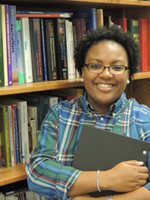 Brittini Brown, a graduate student in Youth Development and Agricultural Education, wrote on the often overlooked links between minority serving institutions (MSI) and agriculture. Her essay, "Food for Thought: The Link Between MSIs and Agriculture", was published in MSIs Unplugged, a blog of the Penn Center for Minority Serving Institutions. Brittini Brown, a graduate student in Youth Development and Agricultural Education, wrote on the often overlooked links between minority serving institutions (MSI) and agriculture. Her essay, "Food for Thought: The Link Between MSIs and Agriculture", was published in MSIs Unplugged, a blog of the Penn Center for Minority Serving Institutions.
Read Brittini's post here: http://msisunplugged.com/2015/08/04/food-for-thought-the-link-between-msis-and-agriculture/
Day of events to celebrate teaching excellence
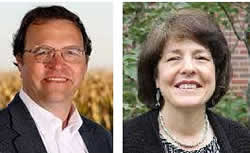 The College of Agriculture will hold its second annual Celebration of Teaching Excellence on September 17. The day's activities will include a teaching workshop conducted by Dr. Kirby Barrick, Professor of Agricultural Education and Communication at the University of The College of Agriculture will hold its second annual Celebration of Teaching Excellence on September 17. The day's activities will include a teaching workshop conducted by Dr. Kirby Barrick, Professor of Agricultural Education and Communication at the University of
Florida, followed by special lectures in the afternoon: Dr. Larry DeBoer, Agricultural Economics, 2015 Kohls Award and Charles B. Murphy Award for Outstanding Undergraduate Teaching winner, will present a talk titled "Next semester I'll do that better"; followed by Dr. Linda Lee, Agronomy, 2015 Outstanding Graduate Mentor and Teacher, will present a lecture titled “Helping Zebras Find their Stripes: Fostering Individual Growth.” Faculty and staff are also invited to participate in the Showcase of Purdue Agriculture Teaching – Innovation and Excellence from 2:45-3:45. Share tips, tricks, pedagogical experiments and results, or innovative practices. This is a chance to share what you have learned with other Agriculture faculty and staff. There will be a free luncheon for those who participate. Contact Dennis Buckmaster (dbuckmas@purdue.edu) with questions. To register your poster (or other similar presentation) for this showcase, please fill out the very brief Qualtrics survey/form at: https://purdue.qualtrics.com/SE/?SID=SV_bDii2z2AFKCVBjf
More information: http://www.agriculture.purdue.edu/in_focus/2015/August/Celebration_of_Teaching_2015_lr.pdf
Nominees sought for Purdue's Hovde Award
Nominations are now being accepted for this year's Frederick L. Hovde Award of Excellence, given annually to a member of Purdue University's faculty or staff who has displayed outstanding educational service to rural Indiana. Any active member of the faculty or staff is eligible. A person's contributions may have been in the classroom, in counseling, in research or through Purdue Extension. The nomination deadline is September 8. Click here for the Hovde Award nomination form.
More information: http://www.purdue.edu/newsroom/releases/2015/Q3/nominations-sought-for-2015-hovde-award-of-excellence.html
Nominations sought for Purdue Agriculture's top awards
Nominations are being accepted for the top two annual awards of the Purdue College of Agriculture and the Ag Alumni Association recognizing achievement and service to the agricultural profession. The Distinguished Agriculture Alumni Award recognizes mid-career alumni of the College of Agriculture who have a record of outstanding accomplishments, have made significant contributions to their profession or society in general and exhibit high potential for professional growth. The alumni association's Certificate of Distinction recognizes those who have contributed to agriculture through professional accomplishments, activity in organizations, community service and other activities that make the nominees a credit to their profession. Nomination deadlines are September 14 for the Distinguished Agriculture Alumni Award and October 1 for the Certificate of Distinction.
Information and nomination forms available here: https://ag.purdue.edu/agalumni/Pages/Awards.aspx
Training modules available for faculty and staff
Risk Management, in collaboration with the Office of the Vice President for Ethics and Compliance and the Office of the Vice President for Human Resources, announces the availability of the Risk Management Employment Claims Initiative education program. The program helps employees and supervisors understand employment-related issues such as discrimination, harassment, disability awareness and accommodations, the Family and Medical Leave Act (FMLA), overtime rates, and other university leave policies. Participants will complete four training modules and corresponding certification quizzes: 1) Equal Opportunity; 2) Americans with Disabilities Act; 3) Wage and Hour Issues for Employees and Supervisors; and 4) Family and Medical Leave Act and University Leave Policies.
The training modules and instructions for accessing the certification quizzes are located on the Purdue Employee Portal. Each training module is approximately 20 to 25 minutes long. Training on the Americans with Disabilities Act and Equal Opportunity will also fulfill College of Agriculture requirements for civil rights training as required by the USDA. All faculty and staff are strongly encouraged to complete these training modules. Faculty and staff participation in these training modules impacts the College's share of insurance costs.
|
|
Awards and Recognitions
 Dean Jay Akridge became Chair of the APLU Board on Agriculture Assembly’s (BAA) Policy Board of Directors on July 1 and will serve a two year term. The BAA is a unit of the Association of Public and Land-grant Universities (APLU) Commission on Food, Environment, and Renewable Resources. Members of the Board on Agriculture Assembly are senior leaders involved in agriculture in all of its phases (food, environment, agriculture, natural resources, and international) across public universities and land-grant colleges of the states, the District of Columbia, the Commonwealth of Puerto Rico, the territories of the Pacific, and the U. S. Virgin Islands. The Policy Board of Directors represents more than 400 BAA members to APLU and is responsible to APLU for the management of BAA affairs as well as directing advocacy efforts for federal funding of agricultural research and extension. Dean Jay Akridge became Chair of the APLU Board on Agriculture Assembly’s (BAA) Policy Board of Directors on July 1 and will serve a two year term. The BAA is a unit of the Association of Public and Land-grant Universities (APLU) Commission on Food, Environment, and Renewable Resources. Members of the Board on Agriculture Assembly are senior leaders involved in agriculture in all of its phases (food, environment, agriculture, natural resources, and international) across public universities and land-grant colleges of the states, the District of Columbia, the Commonwealth of Puerto Rico, the territories of the Pacific, and the U. S. Virgin Islands. The Policy Board of Directors represents more than 400 BAA members to APLU and is responsible to APLU for the management of BAA affairs as well as directing advocacy efforts for federal funding of agricultural research and extension.
 Nathan Mosier, Agricultural and Biological Engineering, is the recipient of the 2015 Agricultural Research Award. He was selected based on his contribution to the combination of bioprocess engineering with plant biology to develop understanding of how plant cell wall components – cellulose, hemicellulose, and lignin – may be thermally converted to cyclic aldehydes and long chain carboxylic acids. The Agricultural Research Award is the highest honor awarded by Agricultural Research office to mid-career faculty members. Dr. Mosier will give a special seminar at a date in the fall to be determined. Nathan Mosier, Agricultural and Biological Engineering, is the recipient of the 2015 Agricultural Research Award. He was selected based on his contribution to the combination of bioprocess engineering with plant biology to develop understanding of how plant cell wall components – cellulose, hemicellulose, and lignin – may be thermally converted to cyclic aldehydes and long chain carboxylic acids. The Agricultural Research Award is the highest honor awarded by Agricultural Research office to mid-career faculty members. Dr. Mosier will give a special seminar at a date in the fall to be determined.
 Larry Caplan, horticulture educator with the Purdue Extension Service in Vanderburgh County, recently earned the International Society of Arboriculture Tree Risk Assessment Qualification credential by successfully completing the course and passing the exam administered by the ISA. The program is designed to increase the standard of practice and safety in the tree care industry. Caplan has been employed with the Purdue Extension Service in Vanderburgh County since 1986. His Tree Risk Assessment Qualification is added to his ISA Certified Arborist certification, which he has held since 1997. He is also an Indiana Accredited Horticulturist through the Indiana Nursery and Landscape Association. Larry Caplan, horticulture educator with the Purdue Extension Service in Vanderburgh County, recently earned the International Society of Arboriculture Tree Risk Assessment Qualification credential by successfully completing the course and passing the exam administered by the ISA. The program is designed to increase the standard of practice and safety in the tree care industry. Caplan has been employed with the Purdue Extension Service in Vanderburgh County since 1986. His Tree Risk Assessment Qualification is added to his ISA Certified Arborist certification, which he has held since 1997. He is also an Indiana Accredited Horticulturist through the Indiana Nursery and Landscape Association.
.jpg) Donya Lester, Executive Director of the Purdue Ag Alumni Association, received the inaugural Ray A. Miller Professional Achievement Award from the National Agricultural Alumni Development Association (NAADA) at the group's annual conference in June. She was recognized for outstanding leadership of the Purdue Ag Alumni Association, her accomplishments as a representative of our College, her national leadership in alumni organizations, and her voice as an advocate for agriculture. NAADA is comprised of 44 of the nation’s colleges of agriculture and related sciences as well as individuals who are volunteering with NAADA and their member institutions. Donya Lester, Executive Director of the Purdue Ag Alumni Association, received the inaugural Ray A. Miller Professional Achievement Award from the National Agricultural Alumni Development Association (NAADA) at the group's annual conference in June. She was recognized for outstanding leadership of the Purdue Ag Alumni Association, her accomplishments as a representative of our College, her national leadership in alumni organizations, and her voice as an advocate for agriculture. NAADA is comprised of 44 of the nation’s colleges of agriculture and related sciences as well as individuals who are volunteering with NAADA and their member institutions.
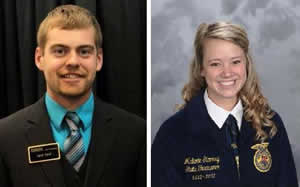 Jared Baird, a senior in agribusiness management, and Mallarie Stookey, a junior in agricultural education, were among 50 people nationwide selected by the National FFA Organization to participate in the 2015 New Century Farmer program. This exclusive, highly competitive program develops young men and women committed to pursuing a career in production agriculture. Participants representing 50 states took part in an intensive seminar July 12-18 in Johnstown, Iowa, where they learned from each other and industry experts during a series of workshops and sessions. Topics included the global marketplace, farm financing, demographic trends and risk management. Jared Baird, a senior in agribusiness management, and Mallarie Stookey, a junior in agricultural education, were among 50 people nationwide selected by the National FFA Organization to participate in the 2015 New Century Farmer program. This exclusive, highly competitive program develops young men and women committed to pursuing a career in production agriculture. Participants representing 50 states took part in an intensive seminar July 12-18 in Johnstown, Iowa, where they learned from each other and industry experts during a series of workshops and sessions. Topics included the global marketplace, farm financing, demographic trends and risk management.
Purdue University agricultural economics students won several awards at the Agricultural and Applied Economics Association's 2015 annual meetings in San Francisco, California, in July, including their second consecutive national championship in a quiz contest. The Purdue Agricultural Economics Academic Quiz Bowl Team competed against 31 other teams consisting of undergraduates from 16 U.S. universities. Purdue fielded two teams and three individuals. Winning the national title was the Purdue Gold Team, consisting of Andrew Johnson, a senior in agricultural economics from Orleans, Indiana; Elizabeth Blinn, a senior in agribusiness and accounting from Warren, Indiana; and Wuzheqian (Jason) Xiao, a junior in agricultural economics from Nanchang, Jiangxi, China. Luis Moisés Peña Lévano, a fourth-year Ph.D. candidate specializing in international agricultural trade from Chincha Alta, Peru, won first place in the Graduate Student Extension Competition for a software program that helps small farmers make financial decisions. He also won the AAEA-Latin American Section Outstanding Research Paper Award for "The Economic Benefits and Costs of Mitigating Climate Interactions Among Carbon Tax, Forest Sequestration and Climate Change-Induced Crop Yield Impacts." Molly Van Dop of Litchfield Park, Arizona, who recently finished her first year of her master's program, took second place in the Extension competition.
|
|
Purdue Agriculture in the News
Purdue Extension now has own building during state fair
 Most Purdue Extension activities during the Indiana State Fair this year are being held under one roof - the newly named Purdue Extension Ag/Hort Building. The building houses several exhibits, featuring one of Extension's newest, The Edible Journey: The Incredible Story of How Your Food Gets to You, as well as food preparation and nutrition demonstrations. The Ag/Hort Building is on the far west side of the fairgrounds in the midway area. "We are thrilled to be in our new home this year, the Purdue Extension Ag/Hort Building," said Danica Kirkpatrick, engagement program manager for Purdue's College of Agriculture. "This makes it easier for fairgoers to find our exhibits that are both fun and educational for the entire family." Most Purdue Extension activities during the Indiana State Fair this year are being held under one roof - the newly named Purdue Extension Ag/Hort Building. The building houses several exhibits, featuring one of Extension's newest, The Edible Journey: The Incredible Story of How Your Food Gets to You, as well as food preparation and nutrition demonstrations. The Ag/Hort Building is on the far west side of the fairgrounds in the midway area. "We are thrilled to be in our new home this year, the Purdue Extension Ag/Hort Building," said Danica Kirkpatrick, engagement program manager for Purdue's College of Agriculture. "This makes it easier for fairgoers to find our exhibits that are both fun and educational for the entire family."
Full story: http://www.purdue.edu/newsroom/releases/2015/Q3/purdue-extension-now-has-own-building-during-state-fair.html
Purdue University innovation wins FDA Food Safety Challenge
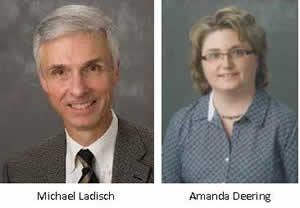 Technology discovered at Purdue that could help government agencies and the food industry detect salmonella more quickly has won the grand prize in the 2014 FDA Food Safety Challenge. Purdue's entry, "Physical method for concentrating Salmonella to detectable levels using automated microfiltration," was developed by a team of researchers led by Michael Ladisch, distinguished professor in the Department of Agricultural and Biological Engineering and Weldon School of Biomedical Engineering and director of Laboratory of Renewable Resources Engineering. Other team members include Amanda Deering, research assistant professor in the Department of Food Science, Eduardo Ximenes, bioprocess research scientist at LORRE; Kirk Foster, senior research engineer, and Jim Jones, software development, in the Weldon School of Biomedical Engineering; Tommy Kreke and Xingya Liu, research staff; Seockmo Ku, graduate student, and Haley Roos and Dayanne Moras, undergraduate students in LORRE. The team will receive $300,000 in prize money to further develop the technology. Technology discovered at Purdue that could help government agencies and the food industry detect salmonella more quickly has won the grand prize in the 2014 FDA Food Safety Challenge. Purdue's entry, "Physical method for concentrating Salmonella to detectable levels using automated microfiltration," was developed by a team of researchers led by Michael Ladisch, distinguished professor in the Department of Agricultural and Biological Engineering and Weldon School of Biomedical Engineering and director of Laboratory of Renewable Resources Engineering. Other team members include Amanda Deering, research assistant professor in the Department of Food Science, Eduardo Ximenes, bioprocess research scientist at LORRE; Kirk Foster, senior research engineer, and Jim Jones, software development, in the Weldon School of Biomedical Engineering; Tommy Kreke and Xingya Liu, research staff; Seockmo Ku, graduate student, and Haley Roos and Dayanne Moras, undergraduate students in LORRE. The team will receive $300,000 in prize money to further develop the technology.
Full story: http://www.purdue.edu/newsroom/releases/2015/Q3/purdue-university-innovation-wins-fda-food-safety-challenge.html
Indianapolis winery takes top prize in international contest
 Easley Winery in Indianapolis won Wine of the Year in the Indy International Wine Competition for its 2014 Traminette, beating out nearly 2,100 other wines for the top honor. Wines from 40 states and 12 countries and as far away as France, Australia, Spain and Greece were judged on appearance, aroma, taste and aftertaste by 42 international judges in the in one of the nation's largest wine competitions. It was held July 29-31 on the Purdue University campus.The Indy International Wine Competition has been organized by the Purdue Wine Grape Team since 1992. Easley Winery in Indianapolis won Wine of the Year in the Indy International Wine Competition for its 2014 Traminette, beating out nearly 2,100 other wines for the top honor. Wines from 40 states and 12 countries and as far away as France, Australia, Spain and Greece were judged on appearance, aroma, taste and aftertaste by 42 international judges in the in one of the nation's largest wine competitions. It was held July 29-31 on the Purdue University campus.The Indy International Wine Competition has been organized by the Purdue Wine Grape Team since 1992.
Full story: http://www.purdue.edu/newsroom/releases/2015/Q3/indianapolis-winery-takes-top-prize-in-international-contest-.html
Indiana corn, soybean crops expected to fall well short of last year
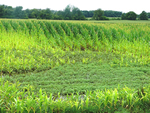 Damaged crops from rain-flooded fields in June and July led the USDA to project big drops in the amount of corn and soybeans Indiana farmers will harvest compared with last year's bounty. Nationally, however, the crops are expected to fare better. The U.S. Department of Agriculture is projecting that Indiana farmers this fall will harvest 867.4 million bushels of corn on an average of 158 bushels per acre, down 20 percent from last year's record 1.08 billion bushels on 188 bushels per acre. Indiana soybean farmers were projected to bring in 278.8 million bushels on 49 per acre, down 9.3 percent from last year when they produced the state's second-largest crop of 307.4 million bushels on 56 per acre. Some areas of the state were hit much harder than others, and some individual fields had both heavily damaged sections as well as areas that will produce good yields, noted Dean Jay Akridge, who moderated a panel of experts analyzing the USDA's August Crop Production Report at the Indiana State Fairgrounds on August 12. Damaged crops from rain-flooded fields in June and July led the USDA to project big drops in the amount of corn and soybeans Indiana farmers will harvest compared with last year's bounty. Nationally, however, the crops are expected to fare better. The U.S. Department of Agriculture is projecting that Indiana farmers this fall will harvest 867.4 million bushels of corn on an average of 158 bushels per acre, down 20 percent from last year's record 1.08 billion bushels on 188 bushels per acre. Indiana soybean farmers were projected to bring in 278.8 million bushels on 49 per acre, down 9.3 percent from last year when they produced the state's second-largest crop of 307.4 million bushels on 56 per acre. Some areas of the state were hit much harder than others, and some individual fields had both heavily damaged sections as well as areas that will produce good yields, noted Dean Jay Akridge, who moderated a panel of experts analyzing the USDA's August Crop Production Report at the Indiana State Fairgrounds on August 12.
Full story: http://www.purdue.edu/newsroom/releases/2015/Q3/indiana-corn,-soybean-crops-expected-to-fall-well-short-of-last-year.html
Program offers beginning farmers a chance to visit five Indiana farms
 New and aspiring farmers will have an opportunity to visit a diverse group of Indiana farms, network with fellow farmers, and learn from experts in a series of workshops and tours offered as part of Purdue University's Beginning Farmer and Rancher program. The series, sponsored by Purdue Extension and the Local Growers Guild, begins August 18 and includes stops throughout the state. Purdue's Beginning Farmer and Rancher program, launched this year, was funded by the U.S. Department of Agriculture to increase the number of farm start-ups in the state and provide direct, practical assistance to anyone who is new to farming, especially operators of small farms and military veterans. New and aspiring farmers will have an opportunity to visit a diverse group of Indiana farms, network with fellow farmers, and learn from experts in a series of workshops and tours offered as part of Purdue University's Beginning Farmer and Rancher program. The series, sponsored by Purdue Extension and the Local Growers Guild, begins August 18 and includes stops throughout the state. Purdue's Beginning Farmer and Rancher program, launched this year, was funded by the U.S. Department of Agriculture to increase the number of farm start-ups in the state and provide direct, practical assistance to anyone who is new to farming, especially operators of small farms and military veterans.
More information: http://www.purdue.edu/newsroom/releases/2015/Q3/program-offers-beginning-farmers-a-chance-to-visit-five-indiana-farms.html
Survey confirms expected decline in Indiana farmland values
 Results of a new Purdue University survey show farmland values across Indiana fell in the past year, in line with a slight pullback analysts anticipated after a decade-long rally. "The results are about what we expected," said Michael Langemeier, Purdue agricultural economist and farmland value specialist. "There were no large surprises." According to the Purdue Land Value and Cash Rent Survey, prices for the state's top-quality farmland declined by 5.1 percent, from an average of $9,765 an acre in 2014 to $9,266 this year. Farmland considered to be of average quality fell by 3.8 percent, from $7,976 to $7,672, and prices for low-quality land fell 4.8 percent, from $6,160 to $5,863. It was the first time since 2009 that all three classes of farmland declined in value in the same year. Values fell in all parts of the state except the 15 counties in southwest Indiana, where prices rose by 13 percent for the best available farmland. Results of a new Purdue University survey show farmland values across Indiana fell in the past year, in line with a slight pullback analysts anticipated after a decade-long rally. "The results are about what we expected," said Michael Langemeier, Purdue agricultural economist and farmland value specialist. "There were no large surprises." According to the Purdue Land Value and Cash Rent Survey, prices for the state's top-quality farmland declined by 5.1 percent, from an average of $9,765 an acre in 2014 to $9,266 this year. Farmland considered to be of average quality fell by 3.8 percent, from $7,976 to $7,672, and prices for low-quality land fell 4.8 percent, from $6,160 to $5,863. It was the first time since 2009 that all three classes of farmland declined in value in the same year. Values fell in all parts of the state except the 15 counties in southwest Indiana, where prices rose by 13 percent for the best available farmland.
Full story: http://www.purdue.edu/newsroom/releases/2015/Q3/survey-confirms-expected-decline-in-indiana-farmland-values.html
Purdue Extension offers more instruction on 'rainscaping'
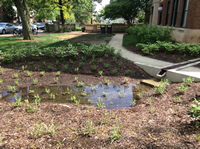 Purdue Extension is continuing its "rainscaping" education program by offering another workshop for people interested in learning how to create attractive home or small-scale community rain gardens while minimizing runoff of pollution. The workshop on Sept. 17-18 at the IUPUC Campus Center, 4601 Central Ave. in Columbus, will teach community leaders how to promote community awareness and provide education for rain garden planning, installation and maintenance. It is structured specifically for Purdue master gardeners, personnel in conservation agencies and organizations, storm water professionals, and landscape professionals and consultants. "Landscapes with rainscaping capture stormwater, which reduces polluted runoff from homes and communities," said Kara Salazar, sustainable communities Extension specialist. The workshop is part of a pilot project of the Purdue Rainscaping Education Program, which conducted similar workshops in the spring. Purdue Extension is continuing its "rainscaping" education program by offering another workshop for people interested in learning how to create attractive home or small-scale community rain gardens while minimizing runoff of pollution. The workshop on Sept. 17-18 at the IUPUC Campus Center, 4601 Central Ave. in Columbus, will teach community leaders how to promote community awareness and provide education for rain garden planning, installation and maintenance. It is structured specifically for Purdue master gardeners, personnel in conservation agencies and organizations, storm water professionals, and landscape professionals and consultants. "Landscapes with rainscaping capture stormwater, which reduces polluted runoff from homes and communities," said Kara Salazar, sustainable communities Extension specialist. The workshop is part of a pilot project of the Purdue Rainscaping Education Program, which conducted similar workshops in the spring.
Full story: http://www.purdue.edu/newsroom/releases/2015/Q3/purdue-extension-offers-more-instruction-on-rainscaping--.html
Industrial hemp production focus of Purdue field day
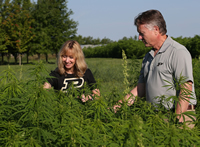 The agronomic and economic potential of industrial hemp, as well as the legal issues surrounding its production, will be the focus of a Purdue Extension field day on August 25. Hemp, one of the world's oldest cultivated crops, was once an important source of oilseed and fiber in the United States, where the hemp industry flourished for centuries until shut down by the Marihuana Tax Act of 1937. The 2014 Farm Bill legalized the growth of industrial hemp for research purposes, but the nearly 80-year freeze in hemp production has left information gaps on how to best produce the crop. Purdue researchers have planted test plots of industrial hemp to help provide answers to basic questions of its production. "This field day will allow the public to see hemp production firsthand - in one of the worst growing seasons in Indiana history," said Janna Beckerman, professor of botany and plant pathology. "We've used our present experience growing hemp and years of additional experience with other cropping systems to inform our production practices. What we have learned sometimes conflicts with the 'conventional wisdom' found on the Internet, but we invite people to come see for themselves." The agronomic and economic potential of industrial hemp, as well as the legal issues surrounding its production, will be the focus of a Purdue Extension field day on August 25. Hemp, one of the world's oldest cultivated crops, was once an important source of oilseed and fiber in the United States, where the hemp industry flourished for centuries until shut down by the Marihuana Tax Act of 1937. The 2014 Farm Bill legalized the growth of industrial hemp for research purposes, but the nearly 80-year freeze in hemp production has left information gaps on how to best produce the crop. Purdue researchers have planted test plots of industrial hemp to help provide answers to basic questions of its production. "This field day will allow the public to see hemp production firsthand - in one of the worst growing seasons in Indiana history," said Janna Beckerman, professor of botany and plant pathology. "We've used our present experience growing hemp and years of additional experience with other cropping systems to inform our production practices. What we have learned sometimes conflicts with the 'conventional wisdom' found on the Internet, but we invite people to come see for themselves."
Full story: http://www.purdue.edu/newsroom/releases/2015/Q3/industrial-hemp-production-focus-of-purdue-field-day.html
Surprise finding: Lake Michigan perch quickly changed course of ‘reverse evolution’
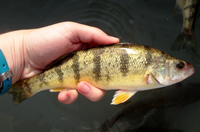 Over-fished yellow perch in Lake Michigan have recovered much quicker - by hundreds of years - in reaching reproductive maturity at a later age and larger size than scientists previously thought was possible, according to a Purdue University study. Analysis of fish assessment data going back to the early 1970s showed the species reversed a trend of reaching reproductive maturity at an earlier age and smaller size than what had been normal. The study period included a time of very high commercial fishing of yellow perch followed by a ban on commercial fishing in southern Lake Michigan. Researchers have long suspected that size-selective fishing - in this case, catching only big yellow perch - can lead to "reverse evolution," in which fish become genetically programmed to mature earlier and smaller and, consequently, produce small fish. "Every expectation was that recovery would take a super-long time," said researcher Tomas Höök, associate professor of fisheries biology in the Department of Forestry and Natural Resources and associate director of Illinois-Indiana Sea Grant. "But we saw that maturation traits of perch in Lake Michigan recovered very rapidly - in a couple of decades." Over-fished yellow perch in Lake Michigan have recovered much quicker - by hundreds of years - in reaching reproductive maturity at a later age and larger size than scientists previously thought was possible, according to a Purdue University study. Analysis of fish assessment data going back to the early 1970s showed the species reversed a trend of reaching reproductive maturity at an earlier age and smaller size than what had been normal. The study period included a time of very high commercial fishing of yellow perch followed by a ban on commercial fishing in southern Lake Michigan. Researchers have long suspected that size-selective fishing - in this case, catching only big yellow perch - can lead to "reverse evolution," in which fish become genetically programmed to mature earlier and smaller and, consequently, produce small fish. "Every expectation was that recovery would take a super-long time," said researcher Tomas Höök, associate professor of fisheries biology in the Department of Forestry and Natural Resources and associate director of Illinois-Indiana Sea Grant. "But we saw that maturation traits of perch in Lake Michigan recovered very rapidly - in a couple of decades."
Full story: http://www.purdue.edu/newsroom/releases/2015/Q3/surprise-finding-lake-michigan-perch-quickly-changed-course-of-reverse-evolution.html
Purdue researchers report sweet corn could make animal vaccines safer
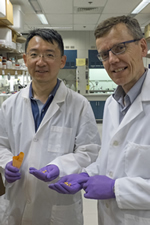 Animal vaccine manufacturers could benefit from the work of two Purdue researchers who are testing biomaterial made from sweet corn to make vaccines safer. Harm HogenEsch (right), a professor in the College of Veterinary Medicine, and Yuan Yao (left), associate professor of food science, are developing biomaterial from a non-genetically modified variety of sweet corn to use as an adjuvant in animal vaccines. Adjuvants are substances that are added to vaccines to stimulate an immune response and to improve the performance of vaccines. Commonly used adjuvants like oil emulsions and aluminum have a number of drawbacks, but the corn-derived biomaterial being developed and tested at Purdue may address these issues in a sustainable way.HogenEsch and Yao are looking to develop the corn-based adjuvant with industry partners. Animal vaccine manufacturers could benefit from the work of two Purdue researchers who are testing biomaterial made from sweet corn to make vaccines safer. Harm HogenEsch (right), a professor in the College of Veterinary Medicine, and Yuan Yao (left), associate professor of food science, are developing biomaterial from a non-genetically modified variety of sweet corn to use as an adjuvant in animal vaccines. Adjuvants are substances that are added to vaccines to stimulate an immune response and to improve the performance of vaccines. Commonly used adjuvants like oil emulsions and aluminum have a number of drawbacks, but the corn-derived biomaterial being developed and tested at Purdue may address these issues in a sustainable way.HogenEsch and Yao are looking to develop the corn-based adjuvant with industry partners.
Full story: http://www.purdue.edu/newsroom/releases/2015/Q3/purdue-researchers-report-sweet-corn-could-make-animal-vaccines-safer.html
June-July rainfall in Indiana not a record, but it's close
 July rainfall combined with June's historic rains to turn the two months into the second-wettest June and July on record in Indiana, according to the Indiana State Climate Office. Rainfall during six weeks from about June 7 to July 21 totaled 15.09 inches, said the climate office, based in Purdue's Department of Agronomy. The wettest June-July was in 1958, when 16.15 inches of rain fell in Indiana. A preliminary statewide total of 6.05 inches of rain fell in Indiana in July, ranking the month as the seventh-wettest July since records began in 1895. The wettest July was in 1992 with 8.55 inches. June set a record as the wettest June in Indiana at 9.04 inches. That exceeded the previous record of 8.13 inches in 1958. July rainfall combined with June's historic rains to turn the two months into the second-wettest June and July on record in Indiana, according to the Indiana State Climate Office. Rainfall during six weeks from about June 7 to July 21 totaled 15.09 inches, said the climate office, based in Purdue's Department of Agronomy. The wettest June-July was in 1958, when 16.15 inches of rain fell in Indiana. A preliminary statewide total of 6.05 inches of rain fell in Indiana in July, ranking the month as the seventh-wettest July since records began in 1895. The wettest July was in 1992 with 8.55 inches. June set a record as the wettest June in Indiana at 9.04 inches. That exceeded the previous record of 8.13 inches in 1958.
Full story: http://www.purdue.edu/newsroom/releases/2015/Q3/june-july-rainfall-in-indiana-not-a-record,-but-its-close.html
Study: Biology, not just physics, controls release of scent compounds from plants
 Research led by Natalia Dudareva, distinguished professor of biochemistry and of horticulture and landscape architecture, suggests active biological mechanisms transport scent and taste compounds known as volatiles from plant cells to the atmosphere, a finding that could overturn the textbook model of volatile emission as a process that occurs solely by diffusion. Volatiles play key roles in plant pollination, reproduction, defense and communication. Researchers thought volatiles diffused through the plant's porous outer cuticle once they built up in high concentrations inside the cell. But the research found disparities between observed volatile release rates and the mathematics of the diffusion model. The researchers showed that toxic amounts of volatiles would accumulate in plant cell membranes if diffusion were the only mechanism at work in their release. They posited that biological mechanisms must also transport volatiles. "This is a completely new way to think about this important biological process," Dudareva said. Research led by Natalia Dudareva, distinguished professor of biochemistry and of horticulture and landscape architecture, suggests active biological mechanisms transport scent and taste compounds known as volatiles from plant cells to the atmosphere, a finding that could overturn the textbook model of volatile emission as a process that occurs solely by diffusion. Volatiles play key roles in plant pollination, reproduction, defense and communication. Researchers thought volatiles diffused through the plant's porous outer cuticle once they built up in high concentrations inside the cell. But the research found disparities between observed volatile release rates and the mathematics of the diffusion model. The researchers showed that toxic amounts of volatiles would accumulate in plant cell membranes if diffusion were the only mechanism at work in their release. They posited that biological mechanisms must also transport volatiles. "This is a completely new way to think about this important biological process," Dudareva said.
Full story: http://www.purdue.edu/newsroom/releases/2015/Q3/study-biology,-not-just-physics,-controls-release-of-scent-compounds-from-plants.html
Partnership provides farmers timely resources for managing soybean diseases
 Purdue Extension has joined six other universities from the Midwest and Ontario, Canada, in a partnership with the North Central Soybean Research Program to create a series of reference materials helping producers identify and manage a variety of soybean diseases. The Soybean Disease Management series will be updated regularly with the latest available information on diseases and management options, said Kiersten Wise, Purdue Extension plant pathologist. Wise said the project began in 2013 with the outbreak of Soybean Vein Necrosis Virus. Experts from the participating institutions stay in regular contact and develop resources on different emerging diseases each year, Wise said. The group has also used recent research to update past publications on common diseases such as white mold and charcoal rot, and soybean seedling blights. All Extension plant pathologists in the North Central region review the publications prior to release. Purdue Extension has joined six other universities from the Midwest and Ontario, Canada, in a partnership with the North Central Soybean Research Program to create a series of reference materials helping producers identify and manage a variety of soybean diseases. The Soybean Disease Management series will be updated regularly with the latest available information on diseases and management options, said Kiersten Wise, Purdue Extension plant pathologist. Wise said the project began in 2013 with the outbreak of Soybean Vein Necrosis Virus. Experts from the participating institutions stay in regular contact and develop resources on different emerging diseases each year, Wise said. The group has also used recent research to update past publications on common diseases such as white mold and charcoal rot, and soybean seedling blights. All Extension plant pathologists in the North Central region review the publications prior to release.
Full story: http://www.purdue.edu/newsroom/releases/2015/Q3/partnership-provides-farmers-timely-resources-for-managing-soybean-diseases.html
|
|
|
|
|
 For many of you, the message this month is ‘Welcome Back’. Whether they have been away from campus for the summer or not, when I ask people how their summer was, the most common response I get is ‘short’. I hope your summer was productive and that you also found some downtime before we launch the fall semester and many other fall activities.
For many of you, the message this month is ‘Welcome Back’. Whether they have been away from campus for the summer or not, when I ask people how their summer was, the most common response I get is ‘short’. I hope your summer was productive and that you also found some downtime before we launch the fall semester and many other fall activities.

 The Ag Research Spotlight shines each month on an individual whose work reflects our commitment to the six strategic themes that guide Agricultural Research at Purdue. Our spotlight for August is on
The Ag Research Spotlight shines each month on an individual whose work reflects our commitment to the six strategic themes that guide Agricultural Research at Purdue. Our spotlight for August is on  As Boiler Gold Rush and the start of the semester draw closer, Purdue is reaching out to students, faculty and staff to encourage increased diligence, attention to traffic and preparation, particularly related to the closure of northbound Interstate 65. Students attending Boiler Gold Rush will move into their on-campus housing on Aug. 17-18, accommodating a shifted Boiler Gold Rush schedule. Boiler Gold Rush will take place Aug. 19-22. Residence hall contracts for returning students begin Friday, Aug. 21. The first day of classes is Aug. 24. Purdue is alerting all students to the closure of northbound Interstate 65 and advising them to seek alternate routes to campus, to expect delays, and to watch for help and guidance from state, area, local and Purdue law enforcement agencies. Purdue faculty and staff are being reminded about possible disruptions to traffic, parking and other activities in the central campus area during the move-in days. Employees should anticipate delays and give themselves additional time for their morning commutes and/or to travel around campus for meetings during this period. Departments and supervisors are asked to exercise discretion and an extra degree of understanding if the additional activity during the workday causes unavoidable delays for workers.
As Boiler Gold Rush and the start of the semester draw closer, Purdue is reaching out to students, faculty and staff to encourage increased diligence, attention to traffic and preparation, particularly related to the closure of northbound Interstate 65. Students attending Boiler Gold Rush will move into their on-campus housing on Aug. 17-18, accommodating a shifted Boiler Gold Rush schedule. Boiler Gold Rush will take place Aug. 19-22. Residence hall contracts for returning students begin Friday, Aug. 21. The first day of classes is Aug. 24. Purdue is alerting all students to the closure of northbound Interstate 65 and advising them to seek alternate routes to campus, to expect delays, and to watch for help and guidance from state, area, local and Purdue law enforcement agencies. Purdue faculty and staff are being reminded about possible disruptions to traffic, parking and other activities in the central campus area during the move-in days. Employees should anticipate delays and give themselves additional time for their morning commutes and/or to travel around campus for meetings during this period. Departments and supervisors are asked to exercise discretion and an extra degree of understanding if the additional activity during the workday causes unavoidable delays for workers.  Sebastian Macias wants to be a software engineer. Thanks to his participation in the
Sebastian Macias wants to be a software engineer. Thanks to his participation in the 
 The College of Agriculture will hold its second annual Celebration of Teaching Excellence on September 17. The day's activities will include a teaching workshop conducted by Dr. Kirby Barrick, Professor of Agricultural Education and Communication at the University of
The College of Agriculture will hold its second annual Celebration of Teaching Excellence on September 17. The day's activities will include a teaching workshop conducted by Dr. Kirby Barrick, Professor of Agricultural Education and Communication at the University of

.jpg) Donya Lester, Executive Director of the
Donya Lester, Executive Director of the  Jared Baird, a senior in agribusiness management, and Mallarie Stookey, a junior in agricultural education, were among 50 people nationwide selected by the
Jared Baird, a senior in agribusiness management, and Mallarie Stookey, a junior in agricultural education, were among 50 people nationwide selected by the  Most
Most  Technology discovered at Purdue that could help government agencies and the food industry detect salmonella more quickly has won the grand prize in the 2014 FDA Food Safety Challenge. Purdue's entry, "Physical method for concentrating Salmonella to detectable levels using automated microfiltration," was developed by a team of researchers led by
Technology discovered at Purdue that could help government agencies and the food industry detect salmonella more quickly has won the grand prize in the 2014 FDA Food Safety Challenge. Purdue's entry, "Physical method for concentrating Salmonella to detectable levels using automated microfiltration," was developed by a team of researchers led by  Easley Winery in Indianapolis won Wine of the Year in the
Easley Winery in Indianapolis won Wine of the Year in the  Damaged crops from rain-flooded fields in June and July led the USDA to project big drops in the amount of corn and soybeans Indiana farmers will harvest compared with last year's bounty. Nationally, however, the crops are expected to fare better. The U.S. Department of Agriculture is projecting that Indiana farmers this fall will harvest 867.4 million bushels of corn on an average of 158 bushels per acre, down 20 percent from last year's record 1.08 billion bushels on 188 bushels per acre. Indiana soybean farmers were projected to bring in 278.8 million bushels on 49 per acre, down 9.3 percent from last year when they produced the state's second-largest crop of 307.4 million bushels on 56 per acre. Some areas of the state were hit much harder than others, and some individual fields had both heavily damaged sections as well as areas that will produce good yields, noted Dean Jay Akridge, who moderated a panel of experts analyzing the USDA's August Crop Production Report at the Indiana State Fairgrounds on August 12.
Damaged crops from rain-flooded fields in June and July led the USDA to project big drops in the amount of corn and soybeans Indiana farmers will harvest compared with last year's bounty. Nationally, however, the crops are expected to fare better. The U.S. Department of Agriculture is projecting that Indiana farmers this fall will harvest 867.4 million bushels of corn on an average of 158 bushels per acre, down 20 percent from last year's record 1.08 billion bushels on 188 bushels per acre. Indiana soybean farmers were projected to bring in 278.8 million bushels on 49 per acre, down 9.3 percent from last year when they produced the state's second-largest crop of 307.4 million bushels on 56 per acre. Some areas of the state were hit much harder than others, and some individual fields had both heavily damaged sections as well as areas that will produce good yields, noted Dean Jay Akridge, who moderated a panel of experts analyzing the USDA's August Crop Production Report at the Indiana State Fairgrounds on August 12. New and aspiring farmers will have an opportunity to visit a diverse group of Indiana farms, network with fellow farmers, and learn from experts in a series of workshops and tours offered as part of Purdue University's Beginning Farmer and Rancher program. The series, sponsored by
New and aspiring farmers will have an opportunity to visit a diverse group of Indiana farms, network with fellow farmers, and learn from experts in a series of workshops and tours offered as part of Purdue University's Beginning Farmer and Rancher program. The series, sponsored by  Results of a new
Results of a new  Purdue Extension is continuing its "rainscaping" education program by offering another workshop for people interested in learning how to create attractive home or small-scale community rain gardens while minimizing runoff of pollution. The workshop on Sept. 17-18 at the IUPUC Campus Center, 4601 Central Ave. in Columbus, will teach community leaders how to promote community awareness and provide education for rain garden planning, installation and maintenance. It is structured specifically for Purdue master gardeners, personnel in conservation agencies and organizations, storm water professionals, and landscape professionals and consultants. "Landscapes with rainscaping capture stormwater, which reduces polluted runoff from homes and communities," said
Purdue Extension is continuing its "rainscaping" education program by offering another workshop for people interested in learning how to create attractive home or small-scale community rain gardens while minimizing runoff of pollution. The workshop on Sept. 17-18 at the IUPUC Campus Center, 4601 Central Ave. in Columbus, will teach community leaders how to promote community awareness and provide education for rain garden planning, installation and maintenance. It is structured specifically for Purdue master gardeners, personnel in conservation agencies and organizations, storm water professionals, and landscape professionals and consultants. "Landscapes with rainscaping capture stormwater, which reduces polluted runoff from homes and communities," said  The agronomic and economic potential of industrial hemp, as well as the legal issues surrounding its production, will be the focus of a Purdue Extension field day on August 25. Hemp, one of the world's oldest cultivated crops, was once an important source of oilseed and fiber in the United States, where the hemp industry flourished for centuries until shut down by the Marihuana Tax Act of 1937. The 2014 Farm Bill legalized the growth of industrial hemp for research purposes, but the nearly 80-year freeze in hemp production has left information gaps on how to best produce the crop. Purdue researchers have planted test plots of industrial hemp to help provide answers to basic questions of its production. "This field day will allow the public to see hemp production firsthand - in one of the worst growing seasons in Indiana history," said
The agronomic and economic potential of industrial hemp, as well as the legal issues surrounding its production, will be the focus of a Purdue Extension field day on August 25. Hemp, one of the world's oldest cultivated crops, was once an important source of oilseed and fiber in the United States, where the hemp industry flourished for centuries until shut down by the Marihuana Tax Act of 1937. The 2014 Farm Bill legalized the growth of industrial hemp for research purposes, but the nearly 80-year freeze in hemp production has left information gaps on how to best produce the crop. Purdue researchers have planted test plots of industrial hemp to help provide answers to basic questions of its production. "This field day will allow the public to see hemp production firsthand - in one of the worst growing seasons in Indiana history," said  Over-fished yellow perch in Lake Michigan have recovered much quicker - by hundreds of years - in reaching reproductive maturity at a later age and larger size than scientists previously thought was possible, according to a Purdue University study. Analysis of fish assessment data going back to the early 1970s showed the species reversed a trend of reaching reproductive maturity at an earlier age and smaller size than what had been normal. The study period included a time of very high commercial fishing of yellow perch followed by a ban on commercial fishing in southern Lake Michigan. Researchers have long suspected that size-selective fishing - in this case, catching only big yellow perch - can lead to "reverse evolution," in which fish become genetically programmed to mature earlier and smaller and, consequently, produce small fish. "Every expectation was that recovery would take a super-long time," said researcher
Over-fished yellow perch in Lake Michigan have recovered much quicker - by hundreds of years - in reaching reproductive maturity at a later age and larger size than scientists previously thought was possible, according to a Purdue University study. Analysis of fish assessment data going back to the early 1970s showed the species reversed a trend of reaching reproductive maturity at an earlier age and smaller size than what had been normal. The study period included a time of very high commercial fishing of yellow perch followed by a ban on commercial fishing in southern Lake Michigan. Researchers have long suspected that size-selective fishing - in this case, catching only big yellow perch - can lead to "reverse evolution," in which fish become genetically programmed to mature earlier and smaller and, consequently, produce small fish. "Every expectation was that recovery would take a super-long time," said researcher  Animal vaccine manufacturers could benefit from the work of two Purdue researchers who are testing biomaterial made from sweet corn to make vaccines safer. Harm HogenEsch (right), a professor in the College of Veterinary Medicine, and
Animal vaccine manufacturers could benefit from the work of two Purdue researchers who are testing biomaterial made from sweet corn to make vaccines safer. Harm HogenEsch (right), a professor in the College of Veterinary Medicine, and  July rainfall combined with June's historic rains to turn the two months into the second-wettest June and July on record in Indiana, according to the
July rainfall combined with June's historic rains to turn the two months into the second-wettest June and July on record in Indiana, according to the  Research led by
Research led by 
 Purdue University is a community where diversity is valued and incidents of hate and bias are not tolerated. Students, faculty, staff, and campus visitors who feel that they have been the victim of a bias related incident (or who have witnessed a bias related incident) are encouraged to report it online at
Purdue University is a community where diversity is valued and incidents of hate and bias are not tolerated. Students, faculty, staff, and campus visitors who feel that they have been the victim of a bias related incident (or who have witnessed a bias related incident) are encouraged to report it online at